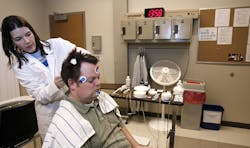Court upholds dismissal of driver for refusing carrier-requested sleep study
A federal court last month ruled that a driver with a body mass index of 35 must submit to a sleep study or risk losing their job – even if they exhibit no other factors for sleep apnea.
The case, heard by the 8th Circuit Court of Appeals, involved Crete Carrier Corp.'s driver Robert J. Parker who was dismissed in 2013 after he refused to abide by company policy requiring all drivers with a BMI over 35 to submit to a carrier-supplied sleep study. Parker's attorney Joy Shiffermiller maintained that Crete's policy violated the American with Disabilities Act (ADA) on the basis of a perceived disability. She also said that the court cited the details of a pending FMCSA rule on sleep apnea as if it was already a regulation.
(The pending regulation would require all drivers with a BMI of 40 to submit to a sleep study as would a BMI of 33 in addition to three other factors including being a male older than 42, loud snoring, heart disease, diabetes and witnessed apnea.)
"That rule isn't even in effect. Nobody was asked to address the rule. Nobody applied it to my client. That's the first part of my objection [to the court's ruling.] The second part of my objection is that under the ADA, you're required to have an individualized inquiry before you ask someone to submit to a medical exam. You have to be able to show a business necessity under the Americans with Disabilities Act," Shiffermiller said.
The court ruled that Crete's requirement for a sleep study was a lawful business necessity, because it kept drivers and the motoring public safer which is an imperative for carriers.
Parker maintained that he had no characteristics of sleep apnea, other than a high BMI, and that a physician's assistant wrote a prescription saying: "I do not feel it is necessary for Robert to have a sleep study." The court record noted that Parker: First, had no documented sleep issues at work. Second, he received a DOT certification. Third, he was as awarded in 2012 for five years of accident-free driving and fourth, his personal medical provider did not feel a sleep study was medically necessary.
Crete's attorney, Nichole Bogen, of Sattler & Bogen, LLP, Lincoln, NE, in the oral argument before the court, noted that no driver who had submitted to a sleep study based on their BMI has ever lost their job. She said: "They may have mild sleep apnea that requires no treatment whatsoever. Or they may have severe apnea that may require a referral to a physician beyond a CPAP machine. They're not getting pulled out of service because they're getting a diagnosis. This is a treatable condition which keeps them in their employment." She noted that employees sign an agreement acknowledging that they may be required to take a sleep study if they meet the company's criteria for the study. Parker signed the agreement after he had been working for Crete for several years.
Bogin also said that because Crete established their own sleep study facility at terminals, giving drivers the ability to take the study during their off hours, they don't lose any driving time or pay. She added: "We get them a reduced price on the [CPAP] equipment and it actually helps their health."
Parker was not available for comment. Crete officials did not return calls requesting more information about their program which began in 2010.
Brent Clark of Seyfarth Shaw in Chicago, an attorney not involved in the case but who has focused for 30 years on transportation law cases and studied the court's opinion, noted that the ADA defense may have been a misstep of Parker's argument because the case focused on him and not a class of people with the same perceived disability. "Under the ADA, the test is whether the class is reasonable," Brent said. "There's a fair amount of risk when you're facing a class argument to say it's all about me. It doesn't have to be the best class, the most perfect class. It just has to be a reasonable definition of class."
Brent also noted that the court probably gave Crete's witness Dr. Richard Schwab, a widely respected sleep apnea expert, a greater weight than that of note from Parker's physician's assistant. "I think physician's assistants are wonderful and qualified, but they are not doctors. You could look at this as a star medical expert on sleep apnea versus someone who doesn't have a medical degree."
Shiffermiller has filed a petition of 'en banc' asking the court to review their decision. There is no established time in which the court must respond, if it chooses to respond at all.
About the Author

Larry Kahaner
Larry Kahaner is an author, journalist, and former FleetOwner contributor.
